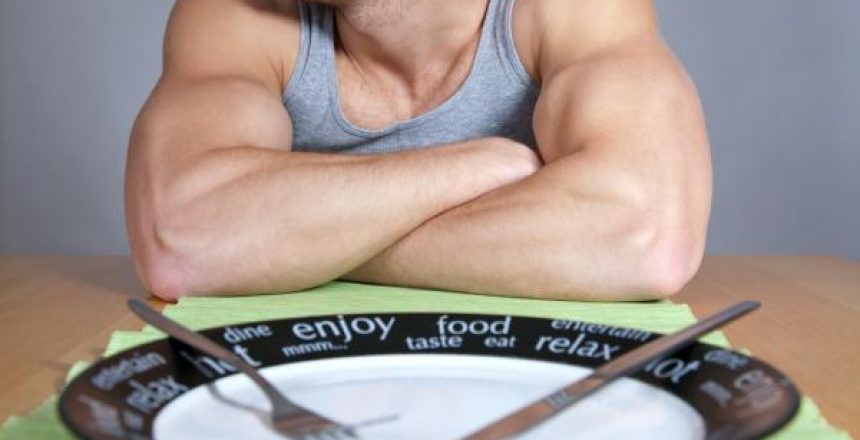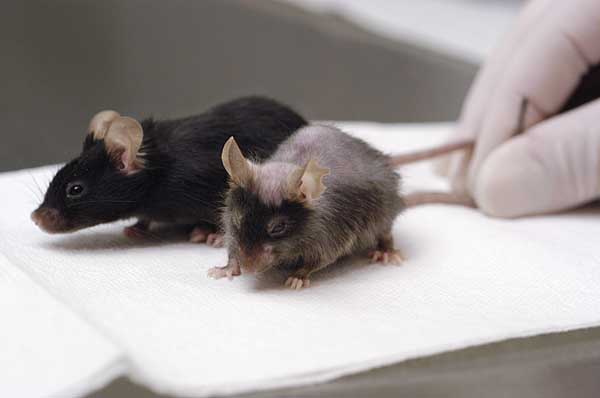Lots of people, even including those wanting to build muscle, are doing intermittent fasting (IF) these days. The goal for these people is to lose body fat and, hopefully, retain muscle or build muscle at the same time.
Others practice IF as an anti-aging method. This has solid science behind it, and it may even be more beneficial for anti-aging purposes than calorie restriction, heretofore the most effective strategy for inhibiting or reversing aging.
Branched-Chain Amino Acids
Many of those in the first camp (lose body fat, retain muscle) use branched-chain amino acids (BCAAs), or leucine (one of the BCAAs) or perhaps whey (which is rich in BCAAs) during their fast. BCAAs are powerful signals that tell cells to ramp up muscle protein anabolism and to decrease muscle protein catabolism. So the use of BCAAs while fasting is the practice that will give one the best shot at retaining or even building muscle, even while doing regular, periodic IF.
However, one thing that BCAAs, whey, or leucine do is to stop autophagy, the cellular self-cleaning process. This process is radically enhanced by fasting, and it is responsible for the beneficial effects of calorie restriction and fasting. No autophagy, no anti-aging benefit from fasting. One of the ways (not the only one) that BCAAs increase muscle protein synthesis is through increased insulin levels. Insulin suppresses autophagy.
So, if you practice IF for the purpose of anti-aging, you must not take any BCAAs, nor, if you are in the habit of taking small amounts of food during a fast, must you ingest any protein or carbohydrates, which raise insulin and stop autophagy, which is the central component of the anti-aging effect of IF.
Avoiding Intermittent Fasting Sabotage
However, fat, or in any case small amounts of it, do not raise insulin and do not signal the metabolic machinery to stop autophagy. Therefore you won’t sabotage an anti-aging fast with small amounts of fat. The best thing to do here, if needed, is to drink coffee or tea with cream; the fat in the cream will help satisfy the appetite, and the caffeine in coffee or tea will also decrease hunger.
That’s why you should be clear on what your intermittent fasting purpose is. If it is for fat loss, by all means use BCAAs to decrease muscle breakdown. If your purpose is anti-aging, you should avoid BCAAs.















23 Comments
Interesting. My primary goal is muscle gain (I consider myself an amateur powerlifter) and I’ve been IFing for a few years now but I hold a strict fast, no calorie intake of any kind. I don’t feel like I’m losing muscle and I am gaining strength, although it would be interesting to see a study of IF+BCAA vs. strict IF.
Yes, it would be interesting to see a study on that. Unfortunately for a lot of things we can only speculate intelligently. Was discussing with someone how we know that autophagy increased after 16 hours of fasting, but I believe there are no human studies.
Cream doesn’t have carbs/protein in it?
I’ve struggled to go from coffee with milk to black. It would be nice to know if a white coffee or three in the morning was compatible with Intermittent fasting.
Cream is basically pure fat, no carbs or protein.
I hate black coffee too.
Thanks for that, I’ll try cream!
Breakfast is the most important meal of the day. Surely IF would be more optimal to skip dinner instead of breakfast? A feeding window between 8am – 4pm, with a 24 hr fast (breakfast sunday to breakfast monday) once per week. Would this be more beneficial than the traditional IF program of skipping breakfast every day? I believe so, if only because of my TCM training (unscientific as it may be) which theorizes that “qi” is in the stomach and spleen “meridians” most prevalently in the morning (7am – 9 am stomach, 9am – 11am spleen/pancreas). Thus there is more energy available for healthy digestion during those times, and conversely less energy available for digestion after 7pm at night.
Richard, it’s undoubtedly perfectly OK to do the fast with the timing you indicate. Whether breakfast is the most important meal of the day I’m very skeptical. Research on whether eating breakfast helps weight loss has been decidedly mixed. Many people, including myself, feel the least hungry in the morning, which I think a good indication of… something.
Cool info…I wondered if I was doing something wrong by taking fish oil and Vitamin d with my coffee in the morning. What about the protein in a theanine dose with coffee? Should I take the amino acids later or just not do it on IF days.
No, not at all. Go ahead take your fish oil and vitamin D, you’re still fasting. Theanine is an amino acid, but I doubt it has much effect on fasting or autophagy since it’s not an amino acid found in proteins, plus the dose at ~200 mg is small enough that it shouldn’t matter.
Hi P.D,
Here’s a controversial question for you: from what I have seen to date, I don’t believe it is necessary to fast or calorie restrict at all. Indeed, from all the research I have read, the only thing you need to do to bring all the health/ longevity benefits are to a.) restrict protein and b.) restrict carbs for at least 16 hours for just a couple of times a week. Pure fat intake (on its own that is) does not affect either autophagy, ketosis or even IGF-1 levels. So go ahead and eat a scoop of coconut oil, MCT oil, spoon of extra virgin olive oil, grass-fed butter, cream in your coffee etc – no problems – get all the health benefits without ever feeling hungry.. You could also add in some low protein/carb but high fibre veg to fill you even further such as spinach, mushrooms and sauerkraut (fermented cabbage), etc. Actually you will feel quite full after eating this!
Of course, this is only for those who are not trying to lose body fat, as of course the body will be using the exogenous fat supplied for energy generation (via ketones) in place of endogenous body fat.. But would this not be an excellent long-term health strategy for those who have already reached their weight loss goals or are indeed trying to gain lean muscle? (If you’re trying to lose body fat, just go easy on the fat and ramp up the fibrous/ low-carb vegetables instead). Would be great to hear if you have seen any science that goes against what I am proposing here..
Hi Rob, yes I think you’re right. If you’re familiar with fasting with Bulletproof coffee, this is essentially what its inventor Asprey advocates: coffee with butter and MCT oil instead of a complete fast. That should give you all the benefits without going hungry. Indeed, you could probably eat as much fat as you want and get the benefits, as shown in that study with infused lipids: no differences in insulin, glucose, ketones, with lipids as opposed to completely fasting.
Many thanks for clarifying on that one P.D. The thing that bugs me is that you quite often read on sites such as Mark’s Daily Apple the recommendation to eat ‘good’ fat: but always caveated with ‘in moderation’. I never understood what science he is basing the ‘in moderation’ bit on. From everything I have read it does seem that eating pure dietary fat will of course impact body fat loss HOWEVER, I have not seen any evidence that eating pure dietary fat will cause a lean individual to gain body fat (or indeed any other negative affects – so long as the ‘good’ fat is not eaten together with high carbs).. So why the ‘in moderation’ caveat do you think?
Possibly due to both weight loss considerations and residual anti-fat bias. As for weight loss, I’ve found that in this racket, the majority of people want to know just one thing, how to lose weight, and if you don’t cater to them, your readership has greatly shrunk. And as for bias, we’ve had it drummed into our heads for the past 4 decades that fat is bad, and if Mark Sisson were to tell people to eat as much fat as they ant, they might think he was crazy or dangerous, and go elsewhere. Those are my guesses.
I’ve noticed though that Bulletproof coffee has gone mainstream to some extent, so now you have ordinary people putting butter in their coffee. I mean, I actually know people in real life (besides myself) who do that. Times are changing.
Hi Dennis,
I have been reading that Leucine taken on its own is broken down solely into ketones (as opposed to the other 2 branched chain aminos that can be broken down into glucose – see this link: https://www.ncbi.nlm.nih.gov/pubmed/6540547
I’m hypothesising that leucine taken on its own during a fast may not hinder autophagy.. Have you seen any studies which back-up or contradict this hypothesis? If correct, that would be very useful as we already know that leucine taken on its own will help prevent muscle catabolism during a 16 hour fast..
Rob, the effects of leucine are so engraved in my mind that I had to go back and see where I got them. As usual, Wulf Droge, from whom I learned so much, explains well, Autophagy and aging—importance of amino acid levels:
Leucine metabolism in regulation of insulin secretion from pancreatic beta cells
Leucine Limitation Induces Autophagy and Activation of Lysosome-dependent Proteolysis in C2C12 Myotubes through a Mammalian Target of Rapamycin-independent Signaling Pathway
Bottom line: leucine activates insulin signaling and mTOR, strongly promotes muscle synthesis – the only amino acid that does so – and its absence initiates autophagy and muscle protein degradation.
Unfortunately, we can’t have our cake and eat it too. Leucine abolishes autophagy and thus shouldn’t be taken during a fast if that fast is for anti-aging purposes, though it would be perfectly acceptable for fat loss.
Thank you for your extremely comprehensive reply on that one Dennis: I guess that answers that question then! But I would also be very interested to hear your thoughts regarding the Jaminet article stating that leucine reduces iron accumulation in the brain..
Just found another very enlightening article on this subject which I am sure will capture your interest: leucine supplementation on its own reduces iron accumulation in the brain, as well as being purely ketogenic (and not glucogenic, so I’m guessing has no impact on raising insulin levels or negatively impacting autophagy..)
Sorry here’s the link: https://perfecthealthdiet.com/2011/03/ketogenic-diets-2-preventing-muscle-and-bone-loss-on-ketogenic-diets/